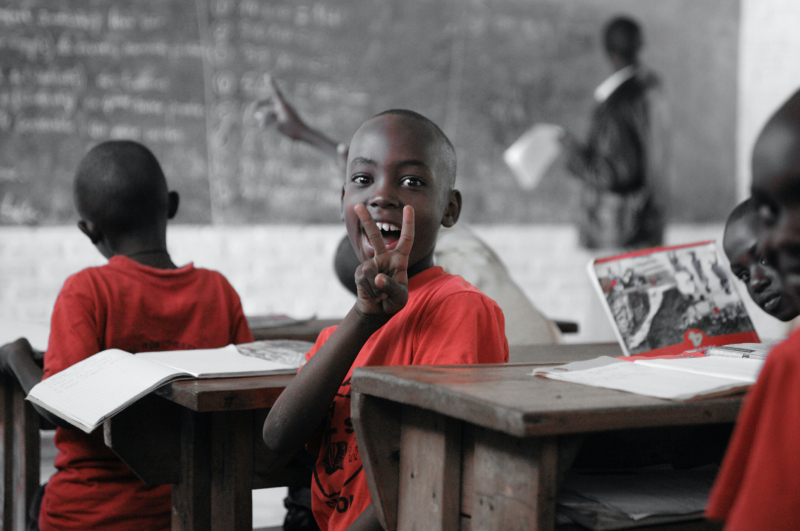

The Day of the African Child (DAC) is celebrated annually on June 16th to commemorate the 1976 Soweto Uprising, where thousands of black school children in South Africa marched in protest against the poor quality of their education.
This year’s theme ‘Education for All Children in Africa’ is evidence that education is still inaccessible for thousands of children in Africa due to various reasons.
The Jesuit Centre for Safeguarding in Africa organized a free webinar on the 13th June to share reflections and on the various dimensions of children’s access to education against the backdrop of the challenges that they face in Africa. The webinar incorporated past and current students of JCSA and it was graced by invaluable remarks from the Principal HUC, Rev Fr Marcel Uwineza, SJ and JCAM president Rev Fr José Minaku SJ. Then there were 3 presenters in the persons of Rev Fr Etienne Mborong, Rev Fr Binamungu Mukasa, SJ and Ms Pascalia Sergon, development officer, AJAN.
Each of the speakers shared their reflections on the theme of the day in relation of their daily work experiences. Fr Etienne, SJ, the GIAN education network delegate from Guinea Conakry shared his experiences in the struggles of African children to access education in a remote rural context. Their challenges are immense in the face of the lack of even critical infrastructure, walking long distances to school, the lack of quality educators and high poverty levels among others. He acknowledged the contribution of Jesuits in the provision of quality education but noted that there is still so much to be done. He concluded that education is a basic right to all children and the lack of it compromises their quality of life and it propels them into a vicious cycle of poverty.
Ms Sergon shared her perspectives on safeguarding as an issue alive in the church and family. She appreciated that abuse of children in any formation of society is a vice that existed long before the conversation of safeguarding commenced. As such, the safeguarding discourse must interrogate the roots of abuse in society even before children get into contact with formal institutions. She also noted that the reactions to abuse in organizations are usually those of laying structures to protect the organizations as a priority. However, she noted that for safeguarding to yield lasting impact, the approaches must focus firstly on the smallest units in the community – the family and the individuals therein. Safeguarding also needs to be embraced as wellbeing and for the mission of the church it is integral to social justice.
Rev Fr Binamungu Mukasa, SJ was the 3rd speaker, sharing on the experiences of safeguarding officers post the training at JCSA and the emerging issues that are appearing in this field. Some of the positive experiences include an increasing appreciation and understanding on the role of safeguarding in advancing the mission of the church, the inclusion of the agenda of safeguarding as integral to mission and the importance of paying attention to various cultures while having this discourse. Safeguarding and protection however have their own share of challenges among the narrow conceptualization of safeguarding to refer to sexual abuse and the skepticism for the topic alluding to it as of foreign origins. Besides safeguarding needs to be aligned to the fast emerging realities amongst them the effect of ICT advancement, Artificial Intelligence (AI), radicalisation and even LGBTQ+ realities among others. It's only when safeguarding efforts and programs remain alive to this everchanging realities that the conversation remains relevant. It is therefore imperative that the trainees remain in contact and in a network of community of practice, where they can reflect as a team and support each other as peers under the support and coordination of the centre (JCSA).
The next webinar will be in August 2024, do not miss out!! The live recording of this webinar is available [HERE].
Related Articles.
On Monday, June 17, 2024, the Jesuit Urumuri Centre brought together members of the AHAPPY Generation clubs from partner schools to celebrate the International Day of the African Child. Read More {HERE}
African Jesuit AIDS Network on African Child Day "Securing Africa's Future by Educating the African Child".
Select Payment Method
Pay by bank transfer
If you wish to make a donation by direct bank transfer please contact Fr Paul Hamill SJ treasurer@jesuits.africa. Fr Paul will get in touch with you about the best method of transfer for you and share account details with you. Donations can be one-off gifts or of any frequency; for example, you might wish to become a regular monthly donor of small amounts; that sort of reliable income can allow for very welcome forward planning in the development of the Society’s works in Africa and Madagascar.
Often it is easier to send a donation to an office within your own country and Fr Paul can advise on how that might be done. In some countries this kind of giving can also be recognised for tax relief and the necessary receipts will be issued.



